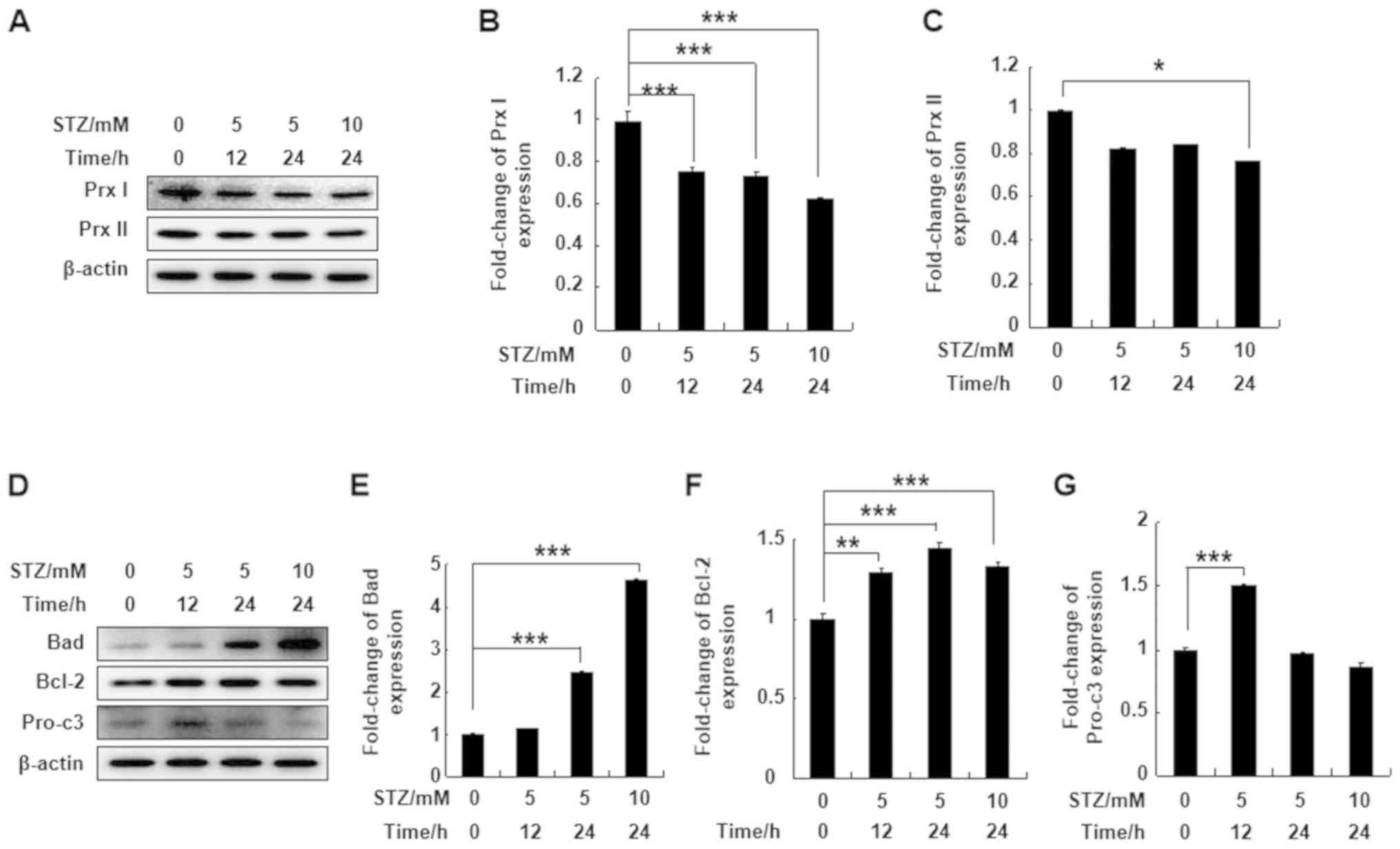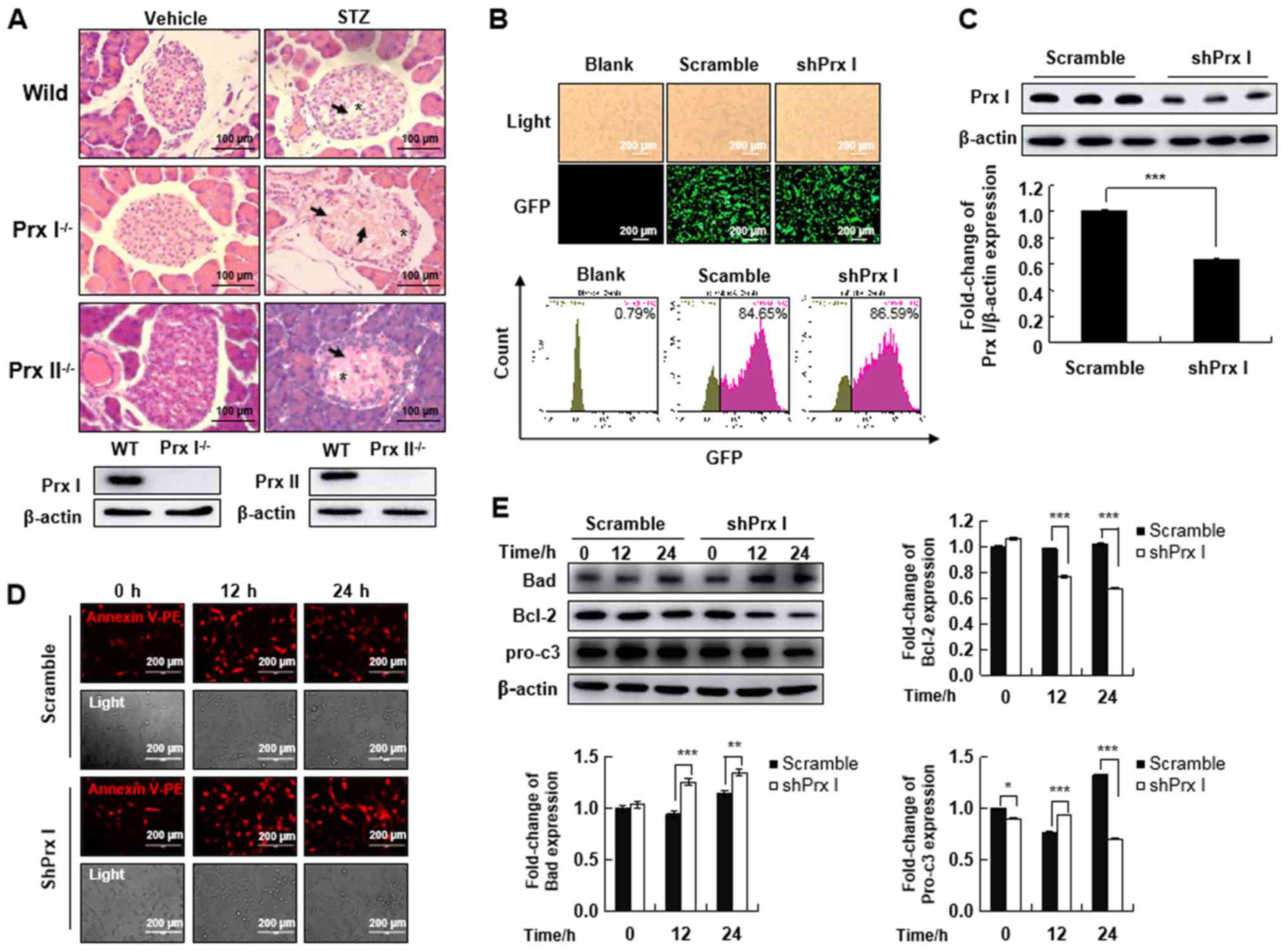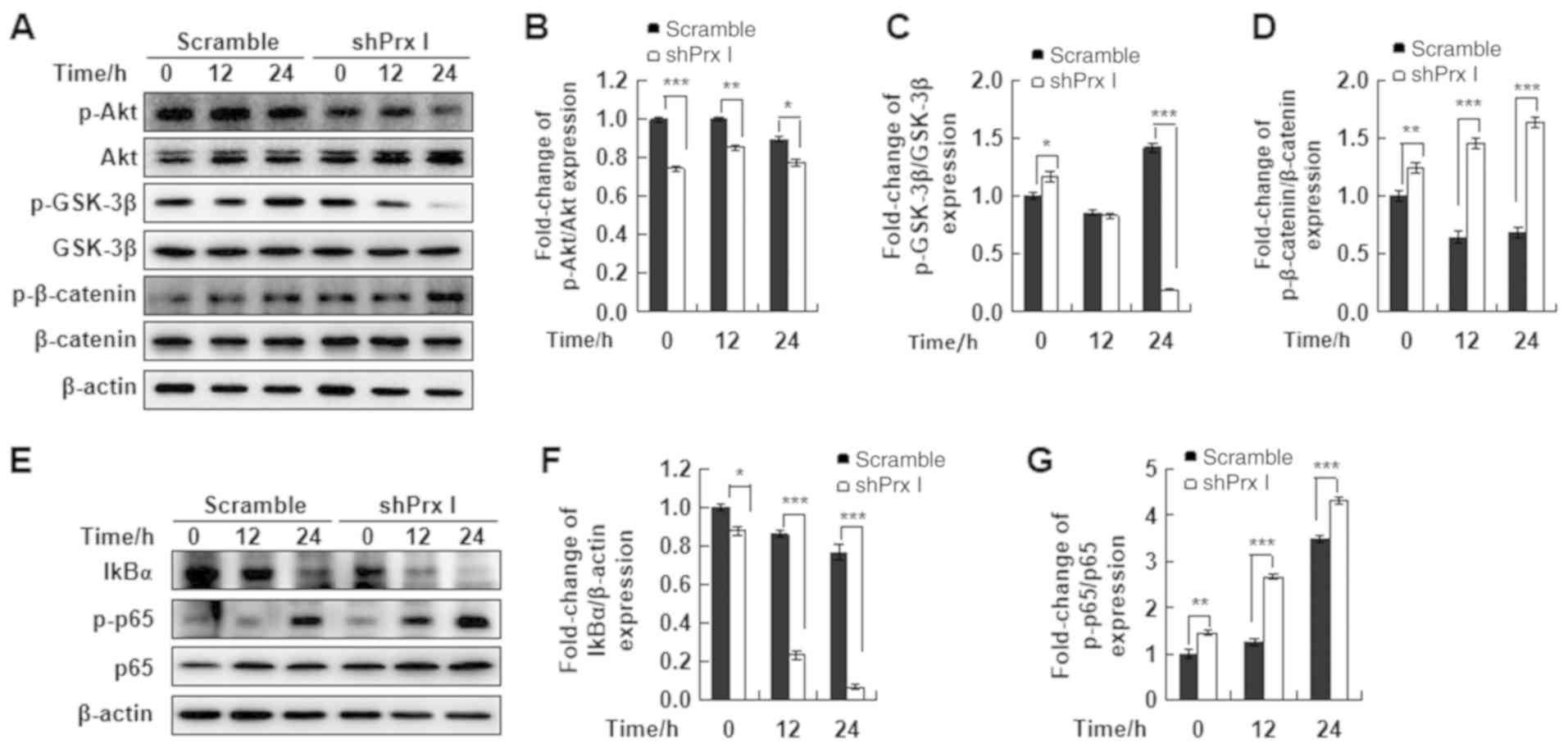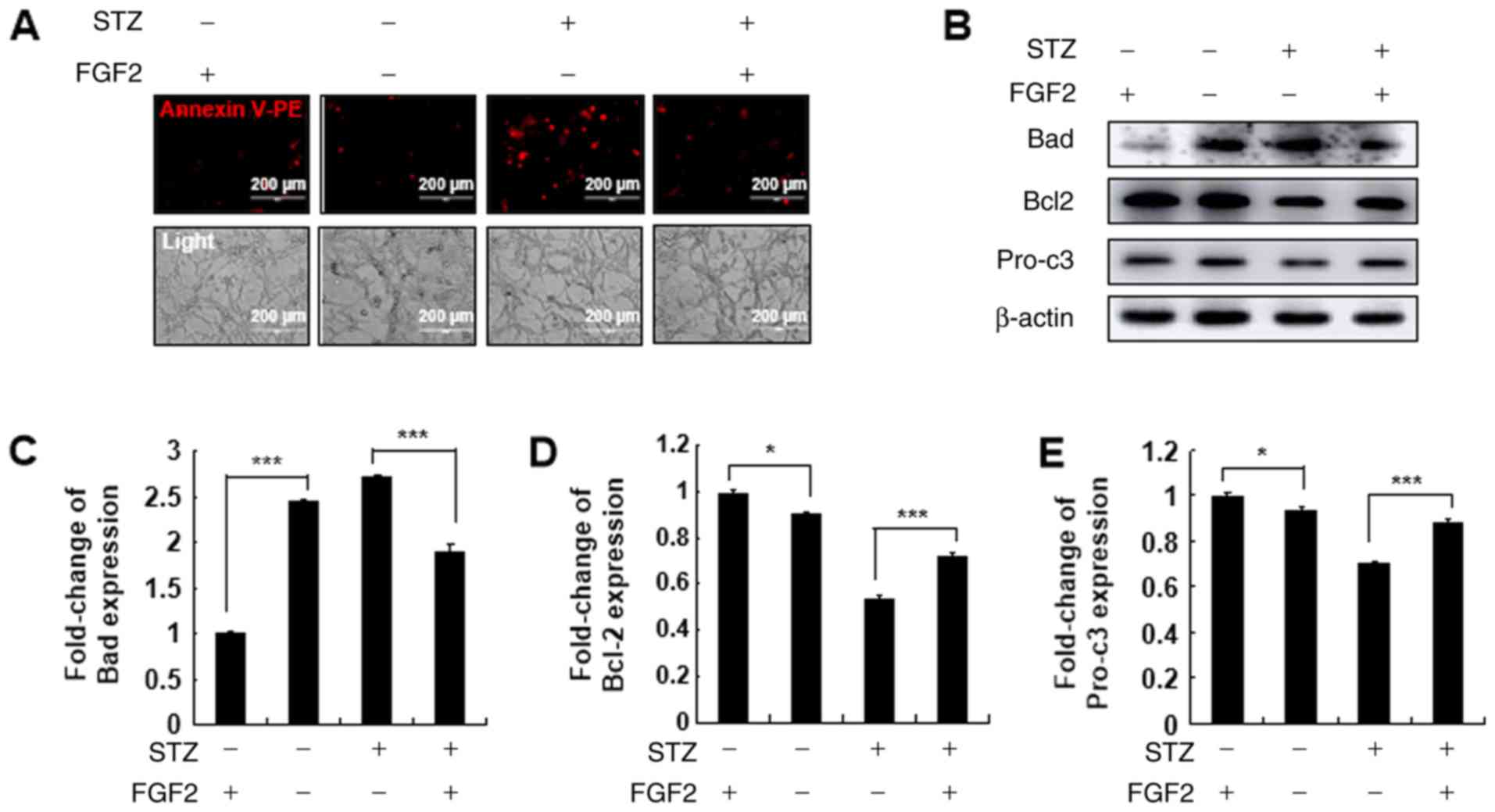|
1
|
Lincez PJ, Shanina I and Horwitz MS:
Reduced expression of the MDA5 gene IFIH1 prevents autoimmune
diabetes. Diabetes. 64:2184–2193. 2015. View Article : Google Scholar : PubMed/NCBI
|
|
2
|
Taborsky GJ Jr, Mei Q, Hackney DJ and
Mundinger TO: The search for the mechanism of early sympathetic
islet neuropathy in autoimmune diabetes. Diabetes Obes Metab. 16
(Suppl 1):S96–S101. 2014. View Article : Google Scholar
|
|
3
|
Yang ZH, Miyahara H and Hatanaka A:
Chronic administration of palmitoleic acid reduces insulin
resistance and hepatic lipid accumulation in KK-A y Mice with
genetic type 2 diabetes. Lipids Health Dis. 10:1202011. View Article : Google Scholar : PubMed/NCBI
|
|
4
|
Guo T and Hebrok M: Stem cells to
pancreatic beta-cells: New sources for diabetes cell therapy.
Endocr Rev. 30:214–227. 2009. View Article : Google Scholar : PubMed/NCBI
|
|
5
|
Ilonen J, Lempainen J and Veijola R: The
heterogeneous pathogenesis of type 1 diabetes mellitus. Nat Rev
Endocrinol. 15:635–650. 2019. View Article : Google Scholar : PubMed/NCBI
|
|
6
|
Spijker HS, Song H, Ellenbroek JH, Roefs
MM, Engelse MA, Bos E, Koster AJ, Rabelink TJ, Hansen BC, Clark A,
et al: Loss of β-cell identity occurs in type 2 diabetes and is
associated with islet amyloid deposits. Diabetes. 64:2928–2938.
2015. View Article : Google Scholar : PubMed/NCBI
|
|
7
|
Rhodes CJ: Type 2 diabetes-a matter of
beta-cell life and death? Science. 307:380–384. 2005. View Article : Google Scholar : PubMed/NCBI
|
|
8
|
Bouwens L and Rooman I: Regulation of
pancreatic beta-cell mass. Physiol Rev. 85:1255–1270. 2005.
View Article : Google Scholar : PubMed/NCBI
|
|
9
|
McKinnon C and Docherty K: Pancreatic
duodenal homeobox-1, PDX-1, a major regulator of beta cell identity
and function. Diabetologia. 44:1203–1214. 2001. View Article : Google Scholar : PubMed/NCBI
|
|
10
|
Porat S, Weinberg-Corem N,
Tornovsky-Babaey S, Schyr-Ben-Haroush R, Hija A, Stolovich-Rain M,
Dadon D, Granot Z, Ben-Hur V, White P, et al: Control of pancreatic
β cell regeneration by glucose metabolism. Cell Metab. 13:440–449.
2011. View Article : Google Scholar : PubMed/NCBI
|
|
11
|
Muruganathan U, Srinivasan S and
Vinothkumar V: Antidiabetogenic efficiency of menthol, improves
glucose homeostasis and attenuates pancreatic β-cell apoptosis in
streptozotocin-nicotinamide induced experimental rats through
ameliorating glucose metabolic enzymes. Biomed Pharmacother.
92:229–239. 2017. View Article : Google Scholar : PubMed/NCBI
|
|
12
|
Pukel C, Baquerizo H and Rabinovitch A:
Destruction of rat islet cell monolayers by cytokines: Synergistic
interactions of interferon-γ, tumor necrosis factor, lymphotoxin,
and interleukin 1. Diabetes. 37:133–136. 1988. View Article : Google Scholar : PubMed/NCBI
|
|
13
|
Campbell IL, Kay T, Oxbrow L and Harrison
L: Essential role for interferon-gamma and interleukin-6 in
autoimmune insulin-dependent diabetes in NOD/Wehi mice. J Clin
Invest. 87:739–742. 1991. View Article : Google Scholar : PubMed/NCBI
|
|
14
|
Gurzov EN and Eizirik DL: Bcl-2 proteins
in diabetes: Mitochondrial pathways of β-cell death and
dysfunction. Trends Cell Biol. 21:424–431. 2011. View Article : Google Scholar : PubMed/NCBI
|
|
15
|
Czabotar PE, Lessene G, Strasser A and
Adams JM: Control of apoptosis by the BCL-2 protein family:
Implications for physiology and therapy. Nat Rev Mol Cell Biol.
15:49–63. 2014. View
Article : Google Scholar : PubMed/NCBI
|
|
16
|
Taniguchi S, Kang L, Kimura T and Niki I:
Hydrogen sulphide protects mouse pancreatic beta-cells from cell
death induced by oxidative stress, but not by endoplasmic reticulum
stress. Br J Pharmacol. 162:1171–1178. 2011. View Article : Google Scholar : PubMed/NCBI
|
|
17
|
Lenzen S: The mechanisms of alloxan- and
streptozotocin- induced diabetes. Diabetologia. 51:216–226. 2008.
View Article : Google Scholar : PubMed/NCBI
|
|
18
|
Green AD, Vasu S and Flatt PR:
Functionality and antidiabetic utility of β-and L-cell containing
pseudoislets. Exp Cell Res. 344:201–209. 2016. View Article : Google Scholar : PubMed/NCBI
|
|
19
|
Zhang B, Lu Y, Campbell-Thompson M,
Spencer T, Wasserfall C, Atkinson M and Song S: Alpha1-antitrypsin
protects beta-cells from apoptosis. Diabetes. 56:1316–1323. 2007.
View Article : Google Scholar : PubMed/NCBI
|
|
20
|
Zhao Y, Zhang X, Chen J, Lin C, Shao R,
Yan C and Chen C: Hexarelin protects rodent pancreatic β-cells
function from cytotoxic effects of streptozotocin involving
mitochondrial signalling pathways in vivo and in vitro. PLoS One.
11:e01497302016. View Article : Google Scholar : PubMed/NCBI
|
|
21
|
Elango B, Dornadula S, Paulmurugan R and
Ramkumar KM: Pterostilbene ameliorates streptozotocin-induced
diabetes through enhancing antioxidant signaling pathways mediated
by Nrf2. Chem Res Toxicol. 29:47–57. 2016. View Article : Google Scholar : PubMed/NCBI
|
|
22
|
Rhee SG and Woo HA: Multiple functions of
peroxiredoxins: Peroxidases, sensors and regulators of the
intracellular messenger H2O2, and protein
chaperones. Antioxid Redox Signal. 15:781–794. 2011. View Article : Google Scholar : PubMed/NCBI
|
|
23
|
Tang Z, Xia N, Yuan X, Zhu X, Xu G, Cui S,
Zhang T, Zhang W, Zhao Y, Wang S and Shi B: PRDX1 is involved in
palmitate induced insulin resistance via regulating the activity of
p38MAPK in HepG2 cells. Biochem Biophys Res Commun. 465:670–677.
2015. View Article : Google Scholar : PubMed/NCBI
|
|
24
|
Bast A, Wolf G, Oberbäumer I and Walther
R: Oxidative and nitrosative stress induces peroxiredoxins in
pancreatic beta cells. Diabetologia. 45:867–876. 2002. View Article : Google Scholar : PubMed/NCBI
|
|
25
|
Al-Masri AA, El Eter E, Tayel S and Zamil
H: Differential associations of circulating peroxiredoxins levels
with indicators of glycemic control in type 2 diabetes mellitus.
Eur Rev Med Pharmacol Sci. 18:710–716. 2014.PubMed/NCBI
|
|
26
|
Lee YJ, Song DS, Yoo JS, Hyung KE, Lee MJ,
Moon YH, Lee IH, Go BS, Park SY and Hwang KW: Protective functions
of peroxiredoxin-1 against cytokine-induced MIN6 pancreatic β-cell
line death. Can J Physiol Pharmacol. 91:1037–1043. 2013. View Article : Google Scholar : PubMed/NCBI
|
|
27
|
Song G, Ouyang G and Bao S: The activation
of Akt/PKB signaling pathway and cell survival. J Cell Mol Med.
9:59–71. 2005. View Article : Google Scholar : PubMed/NCBI
|
|
28
|
Pathak S, Dorfmueller HC, Borodkin VS and
van Aalten DMF: Chemical dissection of the link between
streptozotocin, O-GlcNAc, and pancreatic cell death. Chem Biol.
15:799–807. 2008. View Article : Google Scholar : PubMed/NCBI
|
|
29
|
Srinivasan K, Viswanad B, Asrat L, Kaul CL
and Ramarao P: Combination of high-fat diet-fed and low-dose
streptozotocin-treated rat: A model for type 2 diabetes and
pharmacological screening. Pharmacol Res. 52:313–320. 2005.
View Article : Google Scholar : PubMed/NCBI
|
|
30
|
Mossahebi M, Quan M, Zhang JS and Li X:
FGF Signaling pathway: A key regulator of stem cell pluripotency.
Front Cell Dev Biol. 8:792020. View Article : Google Scholar : PubMed/NCBI
|
|
31
|
Turner NC, Strauss SJ, Sarker D, Gillmore
R, Kirkwood A, Hackshaw A, Papadopoulou A, Bell J, Kayani I,
Toumpanakis C, et al: Chemotherapy with 5-fluorouracil, cisplatin
and streptozocin for neuroendocrine tumours. Br J Cancer.
102:1106–1112. 2010. View Article : Google Scholar : PubMed/NCBI
|
|
32
|
Deeds MC, Anderson JM, Armstrong AS,
Gastineau DA, Hiddinga HJ, Jahangir A, Eberhardt NL and Kudva YC:
Single dose streptozotocin-induced diabetes: Considerations for
study design in islet transplantation models. Lab Anim. 45:131–140.
2011. View Article : Google Scholar : PubMed/NCBI
|
|
33
|
Tonne JM, Sakuma T, Deeds MC, Munoz-Gomez
M, Barry MA, Kudva YC and Ikeda Y: Global gene expression profiling
of pancreatic islets in mice during streptozotocin-induced β-cell
damage and pancreatic Glp-1 gene therapy. Dis Model Mech.
6:1236–1245. 2013. View Article : Google Scholar : PubMed/NCBI
|
|
34
|
Junod A, Lambert AE, Stauffacher W and
Renold AE: Diabetogenic action of streptozotocin: Relationship of
dose to metabolic response. J Clin Invest. 48:21291969. View Article : Google Scholar : PubMed/NCBI
|
|
35
|
Rösen P, Nawroth P, King G, Möller W,
Tritschler HJ and Packer L: The role of oxidative stress in the
onset and progression of diabetes and its complications: A summary
of a Congress Series sponsored byUNESCO-MCBN, the American Diabetes
Association and the German Diabetes Society. Diabetes Metab Res
Rev. 17:189–212. 2001. View Article : Google Scholar : PubMed/NCBI
|
|
36
|
Nahdi AMTA, John A and Raza H: Elucidation
of molecular mechanisms of streptozotocin-induced oxidative stress,
apoptosis, and mitochondrial dysfunction in Rin-5F pancreatic
β-cells. Oxid Med Cell Longev. 2017:70542722017. View Article : Google Scholar : PubMed/NCBI
|
|
37
|
Gehrmann W, Elsner M and Lenzen S: Role of
metabolically generated reactive oxygen species for lipotoxicity in
pancreatic β-cells. Diabetes Obes Metab. 12:149–158. 2010.
View Article : Google Scholar : PubMed/NCBI
|
|
38
|
Mandrup-Poulsen T: Apoptotic signal
transduction pathways in diabetes. Biochem Pharmacol. 66:1433–1440.
2003. View Article : Google Scholar : PubMed/NCBI
|
|
39
|
Ates O, Cayli SR, Yucel N, Altinoz E,
Kocak A, Durak MA, Turkoz Y and Yologlu S: Central nervous system
protection by resveratrol in streptozotocin-induced diabetic rats.
J Clin Neurosci. 14:256–260. 2007. View Article : Google Scholar : PubMed/NCBI
|
|
40
|
Rhee SG: Overview on peroxiredoxin. Mol
Cells. 39:1–5. 2016. View Article : Google Scholar : PubMed/NCBI
|
|
41
|
Pacifici F, Arriga R, Sorice GP, Capuani
B, Scioli MG, Pastore D, Donadel G, Bellia A, Caratelli S, Coppola
A, et al: Peroxiredoxin 6, a novel player in the pathogenesis of
diabetes. Diabetes. 63:3210–3220. 2014. View Article : Google Scholar : PubMed/NCBI
|
|
42
|
Wolf G, Aumann N, Michalska M, Bast A,
Sonnemann J, Beck JF, Lendeckel U, Newsholme P and Walther R:
Peroxiredoxin III protects pancreatic ss cells from apoptosis. J
Endocrinol. 207:163–175. 2010. View Article : Google Scholar : PubMed/NCBI
|
|
43
|
Zhao F and Wang Q: The protective effect
of peroxiredoxin II on oxidative stress induced apoptosis in
pancreatic β-cells. Cell Biosci. 2:222012. View Article : Google Scholar : PubMed/NCBI
|
|
44
|
Maris M, Waelkens E, Cnop M, D'Hertog W,
Cunha DA, Korf H, Koike T, Overbergh L and Mathieu C:
Oleate-induced beta cell dysfunction and apoptosis: A proteomic
approach to glucolipotoxicity by an unsaturated fatty acid. J
Proteome Res. 10:3372–3385. 2011. View Article : Google Scholar : PubMed/NCBI
|
|
45
|
Maris M, Robert S, Waelkens E, Derua R,
Hernangomez MH, D'Hertog W, Cnop M, Mathieu C and Overbergh L: Role
of the saturated nonesterified fatty acid palmitate in beta cell
dysfunction. J Proteome Res. 12:347–362. 2013. View Article : Google Scholar : PubMed/NCBI
|
|
46
|
Elghazi L, Balcazar N and Bernal-Mizrachi
E: Emerging role of protein kinase B/Akt signaling in pancreatic
beta-cell mass and function. Int J Biochem Cell Biol. 38:157–163.
2006. View Article : Google Scholar : PubMed/NCBI
|
|
47
|
Franke TF: PI3K/Akt: Getting it right
matters. Oncogene. 27:6473–6488. 2008. View Article : Google Scholar : PubMed/NCBI
|
|
48
|
Sarbassov DD, Guertin DA, Ali SM and
Sabatini DM: Phosphorylation and regulation of Akt/PKB by the
rictor-mTOR complex. Science. 307:1098–1101. 2005. View Article : Google Scholar : PubMed/NCBI
|
|
49
|
Cho H, Mu J, Kim JK, Chu Q, Crenshaw EB
III, Kaestner KH, Bartolomei MS, Shulman GI and Birnbaum MJ:
Insulin resistance and a diabetes mellitus-like syndrome in mice
lacking the protein kinase Akt2 (PKB beta). Science. 292:1728–1731.
2001. View Article : Google Scholar : PubMed/NCBI
|
|
50
|
Dan HC, Sun M, Kaneko S, Feldman RI,
Nicosia SV, Wang HG, Tsang BK and Cheng JQ: Akt phosphorylation and
stabilization of X-linked inhibitor of apoptosis protein (XIAP). J
Biol Chem. 279:5405–5412. 2004. View Article : Google Scholar : PubMed/NCBI
|
|
51
|
Huo X, Liu S, Shao T, Hua H, Kong Q, Wang
J, Luo T and Jiang Y: GSK3 protein positively regulates type I
insulin-like growth factor receptor through forkhead transcription
factors FOXO1/3/4. J Biol Chem. 289:24759–24770. 2014. View Article : Google Scholar : PubMed/NCBI
|
|
52
|
Li Y, Hansotia T, Yusta B, Ris F, Halban
PA and Drucker DJ: Glucagon-like peptide-1 receptor signaling
modulates β cell apoptosis. J Biol Chem. 278:471–478. 2003.
View Article : Google Scholar : PubMed/NCBI
|
|
53
|
Mishra R: Glycogen synthase kinase 3 beta:
Can it be a target for oral cancer. Mol Cancer. 9:1442010.
View Article : Google Scholar : PubMed/NCBI
|
|
54
|
Parida S, Pal I, Parekh A, Thakur B,
Bharti R, Das S and Mandal M: GW627368X inhibits proliferation and
induces apoptosis in cervical cancer by interfering with EP4/EGFR
interactive signaling. Cell Death Dis. 7:e21542016. View Article : Google Scholar : PubMed/NCBI
|


















